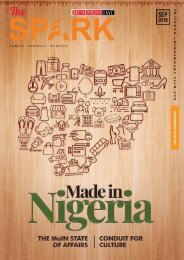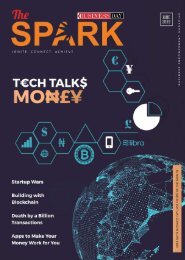You also want an ePaper? Increase the reach of your titles
YUMPU automatically turns print PDFs into web optimized ePapers that Google loves.
The Spark | Ignite / Connect / Achieve<br />
www.thesparkng.com<br />
BUILDING EASY<br />
Powering Nigeria’s<br />
<strong>Business</strong>es<br />
Power is critical to economic growth, particularly for developing nations. Pending when we are able to tackle the<br />
bigger issues, PEBEC has made it a priority to remove bottlenecks to getting connected to the grid.<br />
by Kayode Olagunju<br />
The achievements of the Presidential<br />
Enabling <strong>Business</strong> Environment<br />
Council (PEBEC) with<br />
regards to improving the processes<br />
involved in setting up businesses in Nigeria<br />
are quite clear almost three years<br />
after being set up. One of the focus areas<br />
for PEBEC is the process of getting<br />
connected to electricity – connecting<br />
new businesses to the national grid.<br />
PEBEC’s efforts have resulted in businesses<br />
being able to apply online for<br />
connection to the grid and reduction in<br />
the time taken to be connected from<br />
an average of 176 days to 30 days from<br />
time of application.<br />
In addition to this, the number of procedures<br />
for new connections to the<br />
distribution grid has been reduced to<br />
5, and an e-system for application and<br />
approval for new connections to the<br />
grid by distribution companies has<br />
been created to make the processes<br />
easier.<br />
However, these laudable achievements<br />
are sometimes dwarfed by the inadequacy<br />
of power supply and inefficiencies<br />
of operators; and those worst hit<br />
are business owners. One may therefore<br />
wonder, “How are businesses expected<br />
to cope with the high unreliability<br />
and high cost that comes with being<br />
connected to the national grid?”<br />
Firstly, if you are wondering how being<br />
connected to the grid is a high-cost endeavour<br />
for businesses, let me explain.<br />
The existing industry tariff model is designed<br />
in such a way that commercial<br />
customers (businesses) subsidise the<br />
cost of power for residential customers.<br />
This creates a situation where businesses<br />
end up paying a high price for<br />
an inadequate and inefficient source<br />
of power supply especially where business<br />
premises are not metered and<br />
monthly power bills are estimated.<br />
Based on the foregoing, it is clear that<br />
businesses need to look beyond the<br />
national grid to access the power required<br />
to run their operations. However,<br />
in considering other options such as<br />
Independent Power Plants (IPPs), some<br />
aspects of the existing arrangement<br />
can be borrowed from. For example,<br />
the situation described above where<br />
higher-consuming customers subsidise<br />
the cost for lower-consuming customers<br />
is not such a bad idea if implemented<br />
within a more efficient set-up.<br />
<strong>Business</strong>es must be located within<br />
close proximity to one another (in<br />
some sort of cluster) and the IPP. Next,<br />
some creativity needs to go into commercial<br />
negotiations and Power Purchase<br />
Agreement (PPA) pricing after<br />
large power consumers have taken the<br />
lead in negotiations and engagement<br />
in setting up PPAs where they bear the<br />
larger portion of the tariffs, while lower-consuming<br />
businesses pay a lower<br />
price.<br />
This is not exactly a new model, as<br />
there are close examples that exist<br />
“PEBEC’s efforts have resulted in<br />
businesses being able to apply<br />
online for connection to the grid<br />
and reduction in the time taken<br />
to be connected from an average<br />
of 176 days to 30 days from<br />
time of application.”<br />
today. A good example is the Sura Independent<br />
Power Project at Simpson<br />
Street, Lagos Island where a cluster<br />
of about 700 small businesses now<br />
access constant electricity supply via<br />
a dedicated line from a nearby power<br />
plant. Industry observers may accuse<br />
some of the current operators of being<br />
unwilling and not open to providing<br />
support in actualizing these kind<br />
of models but this is not necessarily<br />
correct. What is required most times<br />
is extensive dialogue and engagement<br />
with all relevant stakeholders to ensure<br />
alignment of interests and buy-in.<br />
In summary, as the government seeks<br />
to improve the ease of doing business,<br />
specifically in the area of getting electricity,<br />
a next step would be to consider<br />
such alternatives, and the cost of such<br />
alternatives can be optimized by employing<br />
existing pricing models where<br />
larger consumers subsidize the cost for<br />
lower consuming businesses.<br />
30 @the<br />
sp<br />
ark<br />
ng

















